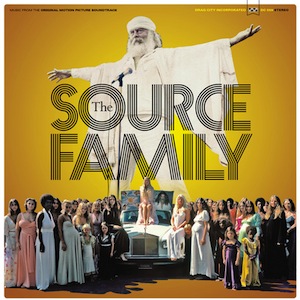 Innocuous enough as a sampler of some deeper, more sprawling artistic discography, The Source Family OST serves a second function as the audio equivalent of an ad pamphlet for its titular utopian cult. Nothing about them needs embellishing; Father Yod's colorful DIY psych collective is as convinced of their own message as they hope you'll be. Every aspect of the Family seems to match the beautiful, spontaneous mythos they spread, even Yod's appropriately spectacular demise. Behind all the posturing and spiritual gravitas, though, laid real music, and a group who made some interesting ideas come to life.
Innocuous enough as a sampler of some deeper, more sprawling artistic discography, The Source Family OST serves a second function as the audio equivalent of an ad pamphlet for its titular utopian cult. Nothing about them needs embellishing; Father Yod's colorful DIY psych collective is as convinced of their own message as they hope you'll be. Every aspect of the Family seems to match the beautiful, spontaneous mythos they spread, even Yod's appropriately spectacular demise. Behind all the posturing and spiritual gravitas, though, laid real music, and a group who made some interesting ideas come to life.
Broken up into a couple of bands, The Source Family OST explores different territories of now hallowed ground in rock and pop music. Spirit Of 76, the first group on the album, lays psychedelic flourish to gospel and traditional folk. Children Of The Sixth Root Race do something similar but more conventional, with "How Long In Time" not sounding too far off from the house band for some '70s educational cartoon. The Original Source Family repurposes old spirituals with chilling results, "Chant 10" being particularly stark and harrowing. Ya Ho Wa 13 has the most adventurous sound of the groups and is considered the primary artifact of the Source Family legend; distorted guitars, krautrock rhythms, and swirling phase effects are all standard fare. Each song by Ya Ho Wa 13 tries out some different styles, "I'm Gonna Take You Home" and "Penetration" striking as especially inspired. The biggest disappointment about Ya Ho Wa 13 is that every song included is an excerpt. This stringent editing brings an especially anticlimactic dissolution during Yod's address to the Beverly High School class of 1974 promoting free improv which, musically progressive and just a little bonkers, preludes a performance which gets cut off to save time.
The music is difficult to approach without a little context. Even setting aside the cult of personality behind Yod—prominent beard enthusiast, possible murderer, definite polygamist—and the organization of the Family, the songs here have serious historical weight. They borrow from acid psych, drone folk, krautrock, gospel, and occasionally a freaky hybrid of those genres unlike many things recorded at the time. They are sleek, even in their frayed looseness and hyperactive genre-hopping, and they commit fully to each disparate sound and style. The bands have serious chops, and there's not a bad song to be found, only a strange story likely to overshadow each note.
The Source Family isn't some cryptic, malevolent assembly of dark figures. They were (and still are, in some cases) business owners, community members, and devotees to an experiment more attuned to the aesthetics of culthood than the textbook social manipulations it entails. A product of their time, their forms and practices can be rediscovered in modern bands who adopt the same kind of sacred personas. The difference between then and now is Yod and Family grew up in a time where religion was to them a sweet, pure commodity, something adopted for secular means but used in total sincerity. Whatever Yod's past might have revealed about him and his intentions, the point is moot. It is, after all, the "eternal now." This is a document of how the fractured weirdness of an original hippie collective manifests itself, in strange and pleasing song.
samples:
 
Read More

